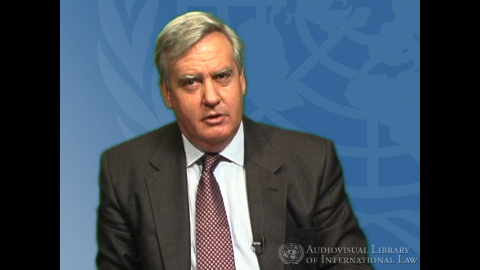Public International Law
Key Concepts

"Public international law governs the relationships between national governments and intergovernmental organizations. It regulates governments and intergovernmental organizations across national boundaries." Marci Hoffman and Katherine Topolos, International Legal Research Tutoria: Public International Lawl (last visited Jan. 23, 2013).
Sources of International Law - Video

Video link (40 minutes)
Source: United Nations Audio Visual Library, The Sources of International Law
Judge Christopher Greenwood, International Court of Justice
Codification Division, Office of Legal Affairs
Copyright © United Nations, 2017. All Rights Reserved.
Terms and Conditions of Use.
Sources as Recognized by the International Court of Justice
a. International Conventions, whether general or particular, establishing rules expressly recognized by the contesting states;
b. International Custom, as evidence of a general practice accepted as law;
c. the General Principles of Law recognized by civilized nations;
d. subject to the provisions of Article 59, Judicial Decisions and the Teachings of the Most Highly Qualified Publicists of the various nations, as subsidiary means for the determination of rules of law.
Article 38, ¶ 1. of the Statute of the International Court of Justices
The U.S. Perspective
The U.S. Perspective
From the Restatement (Third) of Foreign Relations Law § 102 (1987)
(1) A rule of international law is one that has been accepted as such by the international community of states
Other Sources
R, Sources of International Law, Max Planck Encyclopedia of Public International Law (last updated May 2011)
Introductory Guides
-
☞ Duke & Berkeley International Legal Research TutorialThis tutorial is a collaborative project between Duke University School of Law and University of California, Berkeley, School of Law and was created with support from the Duke Center for Instructional Technology.
-
Researching Public International Law by Kent McKeeverFrom Columbia University, Arthur W. Diamond Law Library Research Guides
Top Electronic Resources
Freely available web resources and UMKC subscription databases, ejournals and ebooks
-
☞ American Society of International Law - Electronic Information System for International LawFree web resource
"If you could have only one source, use the EISIL database." Saskia I. Melhorn
This resource is complemented by the Electronic Resources Guide. -
☞ GLOBALEXFree web resource
One of the very best web guides. Published by the Hauser Global Law School Program at NYU School of Law. Some of the key guides include Introduction to Public International Law Research by Vicenç Feliú and Researching Customary International Law, State Practice and the Pronouncements of States regarding International Law by Silke Sahl. -
☞ Max Planck Encyclopaedia of Public International LawUMKC Law building access only
Published by Oxford Press, this encyclopedia includes peer-reviewed articles on every aspect of public international law. -
Cardiff Index to Legal AbbreviationsSearch by abbreviation or title
-
Hein Treaties and Agreements Library-Treaty Guides and IndexesKavass's Guide to the United States Treaties in Force and Kavass's Current Treaty Index are excellent supplements to US Dept. of State Treaties in Force. See also Saskia I Mehlhorn, Fulbright & Jaworski LLP, Foreign & International Law Research (handout) 2 (Spring 2011).
-
UN Audiovisual Library of the International LawFree web resource
The Lecture Series contains a permanent collection of lectures of enduring value on virtually every subject of international law given by leading international law scholars and practitioners from different regions, legal systems, cultures and sectors of the legal profession.
Top Resources in Print
-
☞ ALR InternationalAmerican Law Reports International Annotations and Cases. This set is currently maintained and is located at KZ199.A44. Since it is published by West it is also available online. It is an excellent place to both pick topics for research and begin that research.
-
Bieber's Dictionary of Legal Abbreviations (5th ed. 2001)Excellent resource for tracking down hard-to-find international citations. See reference desk)
-
Duke's List of Classic International Law TextsList of key texts in online tutorial. Check catalog to hold see if we hold in print or as an ebook.
-
Guide to international legal researchNewark, NJ : LexisNexis/Matthew Bender, c2002-
Also available online. -
International law : politics and valuesBy Louis Henkin, M. Nijhoff, c1995.
Inter-library loan -
International law, edited by Malcolm D. Evans.Oxford ; New York : Oxford University Press, 2006. 2nd ed
Inter-library loan -
International Law: A Dictionary (2005)See the reference desk for this excellent dictionary.
-
Oppenheim's international lawEdited by Sir Robert Jennings and Sir Arthur Watts. Longman, 9th ed., 1992-
Inter-library loan -
Parry & Grant encyclopaedic dictionary of international lawEdited by John P. Grant and J. Craig Barker, Oxford University Press, 3rd ed., c2009.
-
Principles of public international lawBy Ian Brownlie, Oxford University Press, 7th ed., 2008.
-
Public international law in a nutshellBy Thomas Buergenthal, Sean D. Murphy. 2007
-
The law of nations : an introduction to the international law of peaceBy J.L. Brierly, Oxford University Press 6d, 1963.
-
Title Dictionary of international and comparative lawBy James R. Fox, Published Dobbs Ferry, N.Y. : Oceana Publications, c2003.
Edition 3rd ed.

)